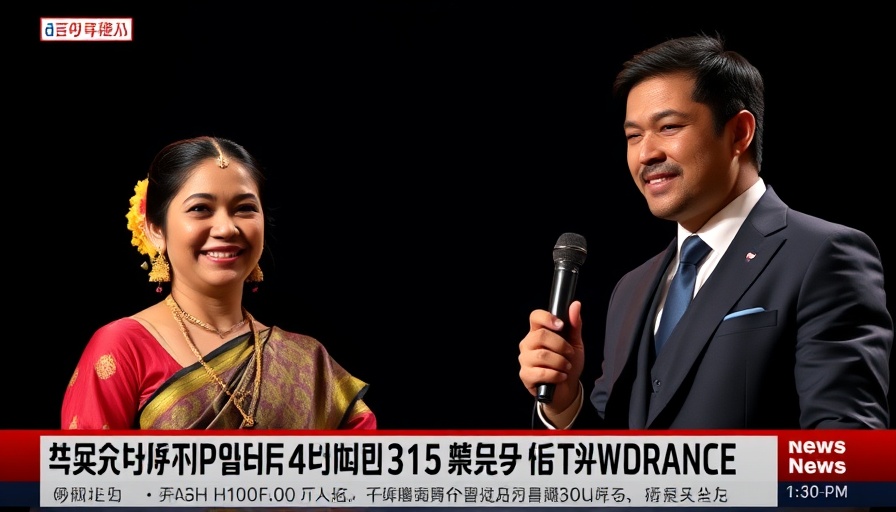
A Shifting Political Landscape: Senator Ireti Kingibe’s Defection
In a surprising turn of events in Nigeria's political scene, Senator Ireti Kingibe has announced her defection from the Labour Party to the African Democratic Congress (ADC) ahead of the 2027 elections. Kingibe describes this transition as a strategic move designed to align with what she perceives as the ADC's vision for the future. This shift comes at a time when major political realignments are affecting the course of governance in the country.
In 'Senator Ireti Kingibe Defects to ADC Ahead of 2027 Elections', the discussion dives into political realignments in Nigeria, exploring key insights that sparked deeper analysis on our end.
Understanding the Political Climate in Nigeria
The political atmosphere in Nigeria is currently in turmoil, with increasing dissatisfaction surrounding electoral processes and governance. Kingibe’s defection is emblematic of a larger trend where politicians are reassessing their affiliations in light of the public’s growing fervor for accountability and transparency in government. The ADC, though still in its developmental phase, offers a beacon of hope for those dissatisfied with the duopoly of the ruling parties.
The Role of Accountability in Nigerian Politics
Kingibe's departure from the Labour Party underscores the necessity for political figures to prioritize the demands of their constituencies over party loyalty. The backdrop of her political transition is marred by allegations of corruption and mismanagement among Nigeria's political elite. Recent calls for accountability, particularly in light of court actions against the Nigerian National Petroleum Company, have intensified public scrutiny of political representatives. Citizens are demanding leaders who will act in their best interests.
Contextualizing Kingibe’s Move Against Other Recent Events
The timing of Senator Kingibe's defection plays into a broader narrative across Nigeria where the public is increasingly vocal about their expectations from political leaders. Cases such as the opposition's demand for investigations into the NNPCL's misappropriation of funds, and allegations of electoral malpractice in Lagos State’s local elections, further exacerbate the already strained political trust. Kingibe’s strategic alignment with ADC could reflect an understanding of the populace's shifting sentiments towards established parties that have largely let them down.
Tracking the Implications of Political Defections
Kingibe's decision to switch allegiances may have significant ramifications not just for her political career but also for the ADC's aspirations going into the 2027 elections. Such moves often signal potential shifts in voter allegiance, especially if constituents perceive that their interests will be better represented. Political realignments serve as barometers for the evolving priorities of the electorate—pressuring elected officials to prioritize actions that reflect public demand.
The Future of the ADC: A Party in Transition
The ADC's reception of Kingibe highlights a crucial opportunity for the party to strengthen its platform as an alternative to the status quo. While still establishing itself, the ADC’s ability to imbue confidence in electors could define its trajectory in the upcoming elections. Kingibe’s comment about the party's developmental phase may resonate with voters who are searching for innovation and genuine representation. Will the ADC rise to the occasion?
Public Sentiment: An Apathy that Could Reshape Democracy
Public disillusionment in Nigeria is at a critical juncture, illustrated by the recent local elections in Lagos State that saw remarkably low voter turnout. Kingibe’s movement to ADC may not simply reflect individual ambition but a broader collective yearning for change. The political apathy among the populace signifies a pressing need for leaders who understand the gravity of their decisions and actively engage their communities.
Conclusion: Promoting Political Consciousness in Nigeria
Kingibe’s defection offers a critical peek into the evolving nature of political alliances and public expectations in Nigeria. As the country gears up for the pivotal 2027 elections, the mixed feelings regarding party loyalty and electoral integrity underline the importance of political consciousness. The upcoming elections are not merely a test of electoral processes but reveal the core needs of the populace—a driving force for real and significant change. In this light, each move by political leaders must be scrutinized as a reflection of their commitment to public service and accountability.
 Add Row
Add Row  Add
Add 


 Add Row
Add Row  Add
Add 

Write A Comment